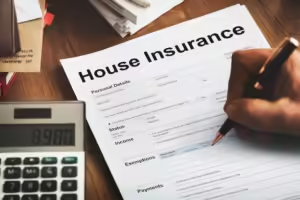WHY’ HOME INSURANCE IMPORTANT?
WHY’S HOME INSURANCE IMPORTANT? Profusion to Home Insurance provides a safety net for homeowners. Home insurance, also appertained to as homeowners insurance, is a type of policy designed to offer financial protection against damage or losses to one’s home and its contents. Whether these damages arise from natural disasters, theft, or other unlooked-for events, home insurance provides peace of mind. Beyond securing the home’s physical structure, this insurance also extends content to particular effects and can offer liability protection against injuries that might occur on your property. WHY’S HOME INSURANCE IMPORTANT? Suppose home insurance is a protective guard. It stands between homeowners and implicit high costs arising from unexpected events.
WHAT HAPPENS WHEN YOU DON’T HAVE HOME INSURANCE?
You can’t predict a fire passing in your home, as an illustration. Without this protection, homeowners might find themselves bearing hefty charges for property damage or other arrears. Also, if you’re planning on taking a mortgage, lenders generally mandate home insurance, making sure their investment remains defended. WHAT HAPPENS WHEN YOU DON’T HAVE HOME INSURANCE? Choosing to go without home insurance is similar to traipsing on thin ice. Homeowners are left vulnerable, having to cover form or relief costs independently. Also, the absence of home insurance might produce challenges in securing financial aid or loans for future parcels, as most mortgage providers have a strict demand for home insurance. Types of Homeowners Insurance Programs to Know Different homeowners have unique conditions, and the insurance request offers different programs to feed these conditions. Lastly, homeowners can choose from factual Cash Value, relief Cost, and Guaranteed or Extended relief Cost.

Factual CASH VALUES Relief COSTS GUARANTEED
Understanding the differences between these options can impact the position of content and, ultimately, the payouts you’ll admit in case of a claim. Factual CASH VALUES. Relief COSTS. GUARANTEED (OR EXTENDED) relief COST/ VALUE Breaking down these insurance options can help homeowners make informed opinions. Let’s claw into their distinct features factual CASH VALUE (ACV) Description This covers the house and the value of your effects after abating for deprecation. Pros constantly come with a lower decoration than other programs. Straightforward in its valuation system. Cons Might not cover the full cost to replace or repair damage, due to deprecation deductions. May affect in out-of- fund charges in case of significant damages. Relief COST (RC) Description Helps homeowners cover the factual cost of replacing their home or goods without counting for deprecation.
WHAT DOES HOME INSURANCE COVER?
Provides more extensive content than ACV. Makes sure homeowners can restore their property to its original state without incurring spare costs. Cons generally have an advanced decoration than ACV. Might not cover extended damage in case of a disaster that affects broader regions or leads to increased costs of paraphernalia labor. GUARANTEED OR EXTENDED relief COST/ VALUE description Pays for repairing or rebuilding the home, indeed if the cost goes above the policy limit. Pros Offers the most comprehensive content among the three. Provides peace of mind in case of major disasters where costs escalate due to increased demand for paraphernalia and labor. Cons Comes with the topmost decorations. Not available in all countries or from all insurers.
WHAT ISN’T COVERED in HOMEOWNERS INSURANCE?
Conservation damage remains the homeowner’s responsibility and is constantly barred from utmost programs. WHAT ISN’T COVERED in HOMEOWNERS INSURANCE? While home insurance covers a broad range of damages, certain rejections apply. Generally, programs don’t cover damage performed by poor or remitted conservation. Also, homeowners in certain areas might find that natural disasters like earthquakes or cataracts aren’t covered and bear separate programs or add-ons. How to cover Smart for Home Insurance HOW ARE HOME INSURANCE RATES DETERMINED? Multiple factors impact your decoration. The home’s position, age, construction type, and indeed contiguity to a water source or fire department can impact rates. Also, your credit score, claim history, and chosen deductible play a part. The further risk the insurer perceives, the more advanced your decoration.
TIPS FOR Copping A HOMEOWNERS INSURANCE POLICY
TIPS FOR Copping A HOMEOWNERS INSURANCE POLICY When buying insurance, ensure you’re getting respectable content, not just the cheapest policy. Understand the rejections, consider speeding insurance products for abatements, and assess the company’s character for claim agreements. KNOW HOW MUCH COVERAGE YOU NEED Assessing your conditions is consummated. Consider the cost of rebuilding your home, replacing particular effects, and implicit liability costs when determining your content amount. Regularly reviewing and streamlining your policy, especially after significant purchases or home advancements, is vital. Consider the company’s financial stability, customer service reviews, claim processing effectiveness, and any fresh benefits or services they might offer. LOOK FOR MULTIPLE POLICY Abatements Multitudinous insurance companies offer abatements for speeding.
DO HOME INSURANCE COVER, PLUMBING ISSUES, ROOF LEAKS, AND REPAIRS?
It can lead to significant savings while simplifying your insurance operation. MAKE REGULAR POLICY REVIEWS AND COMPARISONS Dedication is estimable, but regularly comparing programs ensures you’re getting the swish deal. Requests evolve, and newer, more provident options might crop up. Fresh Considerations DO HOME INSURANCE COVER earth, PLUMBING ISSUES, ROOF LEAKS, AND FOUNDATION REPAIRS? Coverage for the earth is constantly contingent on the source of moisture. However, analogous to a burst pipe, the policy might cover the costs, If Earth results from a covered pitfall. Also, unlooked-for plumbing issues like burst pipes might be covered, but damage due to lack of conservation isn’t. Roof leaks and foundation repairs follow a similar pattern sudden, unlooked-for damage might be covered, while wear and tear and gash and incision or neglected conservation isn’t.

SECURITY & EXTERNAL DAMAGES COVERAGE FOR THEFT,
SECURITY & EXTERNAL DAMAGES COVERAGE FOR THEFT, TERMITE DAMAGE, FENCES, AND HVAC. Insurance programs generally offer protection against theft, covering both the structure and particular effects. Still, ensuring you’ve proved your goods to claim them is vital. Termite damage, constantly seen because of neglect, isn’t generally covered. About the Author This composition was drafted by the LOOP Marketing Team. Comprising of seasoned professionals with grit in insurance assiduity, our platoon is devoted to furnishing compendiums with accurate, up-to-date, and precious information. At Circle, we are passionate about helping families navigate the world of auto insurance, ensuring they get stylish content at the most affordable rates. Learn further about our charge and values then. NATURAL disasters COVERING HURRICANES, TORNADOES, EARTHQUAKES, AND WATER DAMAGE.
WHAT DOES HOME INSURANCE LOOK LIKE?
WHAT DOES THE CLAIMS PROCESS FOR HOME INSURANCE LOOK LIKE? Document the damages with prints, videos, and detailed notes. Your insurance company might shoot an adjuster to assess the situation. Post-evaluation, the company will either authorize or deny the claim. However, they’ll determine the compensation quantum, minus your deductible, If approved. How to Optimize Your Home Insurance Costs MAINTAIN A SECURITY SYSTEM AND PLAN FOR Emendations Installing security systems can frequently cost abatements premiums. However, consider how they might impact your insurance — upgrading electrical systems might reduce rates while adding a pool might increase them If planning emendations.


